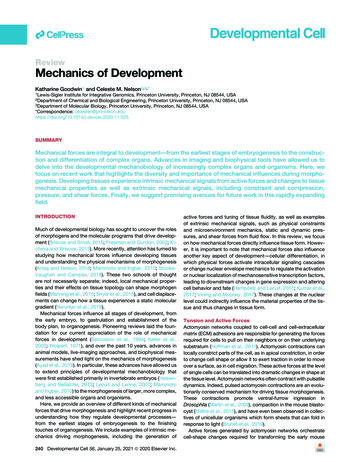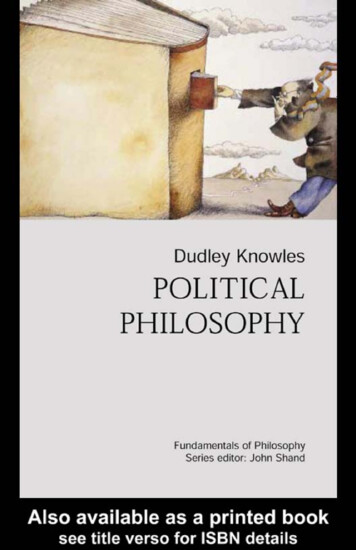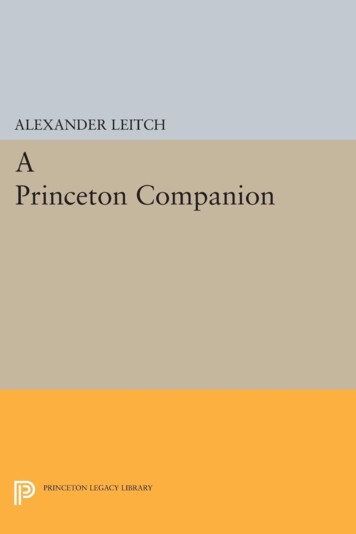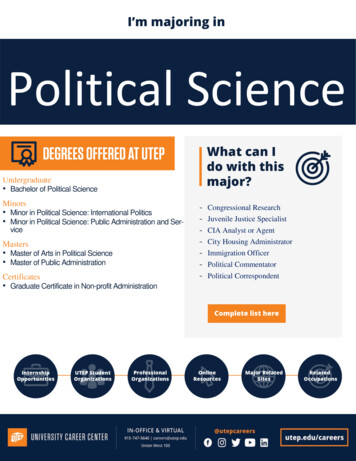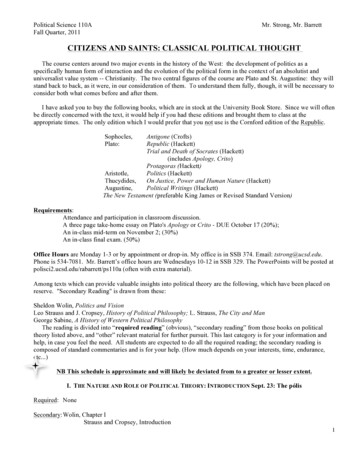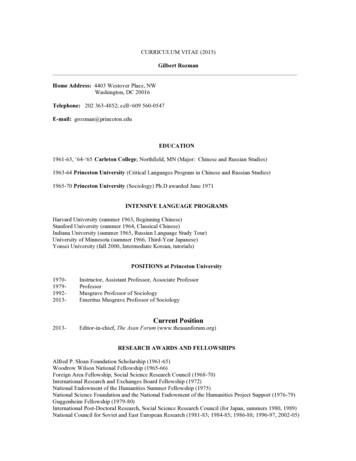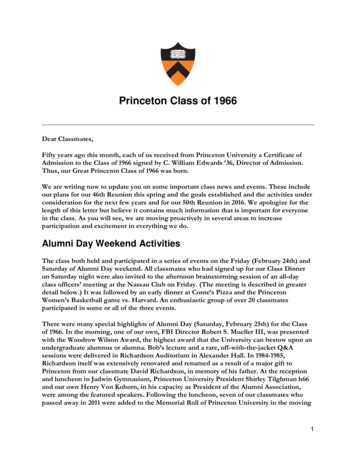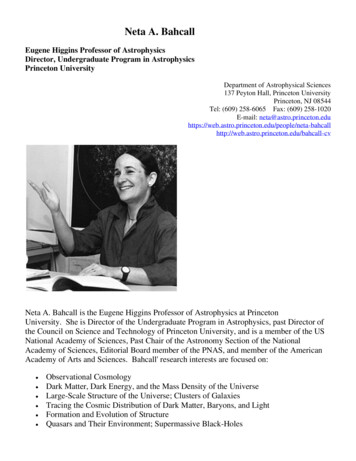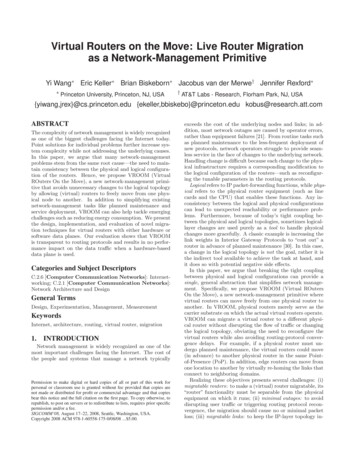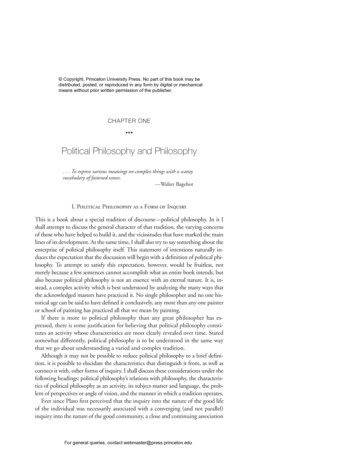
Transcription
Copyright, Princeton University Press. No part of this book may bedistributed, posted, or reproduced in any form by digital or mechanicalmeans without prior written permission of the publisher.CHAPTER ONE Political Philosophy and Philosophy. . . To express various meanings on complex things with a scantyvocabulary of fastened senses.—Walter BagehotI. Political Philosophy as a Form of InquiryThis is a book about a special tradition of discourse—political philosophy. In it Ishall attempt to discuss the general character of that tradition, the varying concernsof those who have helped to build it, and the vicissitudes that have marked the mainlines of its development. At the same time, I shall also try to say something about theenterprise of political philosophy itself. This statement of intentions naturally induces the expectation that the discussion will begin with a definition of political philosophy. To attempt to satisfy this expectation, however, would be fruitless, notmerely because a few sentences cannot accomplish what an entire book intends, butalso because political philosophy is not an essence with an eternal nature. It is, instead, a complex activity which is best understood by analyzing the many ways thatthe acknowledged masters have practiced it. No single philosopher and no one historical age can be said to have defined it conclusively, any more than any one painteror school of painting has practiced all that we mean by painting.If there is more to political philosophy than any great philosopher has expressed, there is some justification for believing that political philosophy constitutes an activity whose characteristics are most clearly revealed over time. Statedsomewhat differently, political philosophy is to be understood in the same waythat we go about understanding a varied and complex tradition.Although it may not be possible to reduce political philosophy to a brief definition, it is possible to elucidate the characteristics that distinguish it from, as well asconnect it with, other forms of inquiry. I shall discuss these considerations under thefollowing headings: political philosophy’s relations with philosophy, the characteristics of political philosophy as an activity, its subject-matter and language, the problem of perspectives or angle of vision, and the manner in which a tradition operates.Ever since Plato first perceived that the inquiry into the nature of the good lifeof the individual was necessarily associated with a converging (and not parallel)inquiry into the nature of the good community, a close and continuing associationFor general queries, contact webmaster@press.princeton.edu
Copyright, Princeton University Press. No part of this book may bedistributed, posted, or reproduced in any form by digital or mechanicalmeans without prior written permission of the publisher.4CHAPTER ONEhas persisted between political philosophy and philosophy in general. Not onlyhave most of the eminent philosophers contributed generously to the main stockof our political ideas, but they have given the political theorist many of his methods of analysis and criteria of judgment. Historically, the main difference betweenphilosophy and political philosophy has been a matter of specialization rather thanone of method or temper. By virtue of this alliance, political theorists accepted astheir own the basic quest of the philosopher for systematic knowledge.There is a still another fundamental sense in which political theory is linkedto philosophy. Philosophy can be distinguished from other methods of elicitingtruths, such as the mystic vision, the secret rite, truths of conscience or of privatefeelings. Philosophy claims to deal with truths publicly arrived at and publiclydemonstrable.1 At the same time, one of the essential qualities of what is political, and one that has powerfully shaped the view of political theorists about theirsubject-matter, is its relationship to what is “public.” Cicero had this in mindwhen he called the commonwealth a res publica, a “public thing” or the “propertyof a people.” Of all the authoritative institutions in society, the political arrangement has been singled out as uniquely concerned with what is “common” to thewhole community. Certain functions, such as national defense, internal order,the dispensing of justice, and economic regulation, have been declared the primary responsibility of political institutions, largely on the grounds that the interests and ends served by these functions were beneficial to all of the members ofthe community. The only institution that ever rivaled the authority of the political order was the mediaeval Church; yet this was made possible only because theChurch, in assuming the characteristics of a political regime, had become something other than a religious body. The intimate connection existing between political institutions and public concerns has been taken over in the practices ofphilosophers; political philosophy has been taken to mean reflection on mattersthat concern the community as a whole.It is fitting, therefore, that the inquiry into public matters should be conducted according to the canons of a public type of knowledge. To take the otheralternative, to ally political knowledge with private modes of cognition, would beincongruous and self-defeating. The dramatic symbol of the right alliance was thedemand of the Roman plebs that the status of the Twelve Tables of the law betransformed from a priestly mystery cognizable only by the few to a public formof knowledge accessible to all.II. Form and SubstanceTurning next to the subject-matter of political philosophy, even the most cursoryexamination of the masterpieces of political literature discloses the continualreappearance of certain problem-topics. Many examples could be listed, but hereFor general queries, contact webmaster@press.princeton.edu
Copyright, Princeton University Press. No part of this book may bedistributed, posted, or reproduced in any form by digital or mechanicalmeans without prior written permission of the publisher.POLITICAL PHILOSOPHY AND PHILOSOPHY5we need mention only a few, such as the power relationships between ruler andruled, the nature of authority, the problems posed by social conflict, the status ofcertain goals or purposes as objectives of political action, and the character of political knowledge. No political philosopher has been interested in all of theseproblems to the same degree, yet there has been a sufficiently widespread consensus about the identity of the problems to warrant the belief that a continuityof preoccupations has existed. Nor does the fact that philosophers have often violently disagreed about solutions cast doubt upon the existence of a commonsubject-matter. What is important is the continuity of preoccupations, not theunanimity of response.Agreement about subject-matter presupposes in turn that those who are interested in extending knowledge of a particular field share in a common understanding about what is relevant to their subject and what ought to be excluded.In reference to political philosophy, this means that the philosopher should beclear about what is political and what is not. Aristotle, for example, argued in theopening pages of the Politics that the role of the statesman (politikos) ought not tobe confused with that of the slave-owner or head of a household; the first wasproperly political, the latter were not. The point that Aristotle was making is stillof vital importance, and the difficulties of preserving a clear notion of what is political form the basic theme of this book. Aristotle was alluding to the troublesthat the political philosopher experiences in trying to isolate a subject-matterwhich, in reality, cannot be isolated. There are two main reasons for the difficulty.In the first place, a political institution, for example, is exposed to impinging influences of a non-political kind so that it becomes a perplexing problem of explanation as to where the political begins and the non-political leaves off. Secondly,there is the widespread tendency to utilize the same words and notions in describing non-political phenomena that we do in talking about political matters.In contrast to the restricted technical usages of mathematics and the natural sciences, phrases like “the authority of the father,” “the authority of the church,” or“the authority of Parliament” are evidence of the parallel usages prevailing in social and political discussions.This poses one of the basic problems confronting the political philosopherwhen he tries to assert the distinctiveness of his subject-matter: what is political?what is it that distinguishes, say, political authority from other forms of authority, or membership in a political society from membership in other types of associations? In attempting an answer to these questions, centuries of philosophershave contributed to a conception of political philosophy as a continuing form ofdiscourse concerning what is political and to a picture of the political philosopheras one who philosophizes about the political. How have they gone about doingthis? How have they come to single out certain human actions and interactions,institutions and values, and to designate them “political”? What is the distinctiveFor general queries, contact webmaster@press.princeton.edu
Copyright, Princeton University Press. No part of this book may bedistributed, posted, or reproduced in any form by digital or mechanicalmeans without prior written permission of the publisher.6CHAPTER ONEcommon feature of certain types of situations or activities, such as voting and legislating, that allows us to call them political? Or what conditions must a given action or situation satisfy in order to be called political?In one sense, the process of defining the area of what is political has not beenmarkedly different from that which has taken place in other fields of inquiry. Noone would seriously contend, for example, that the fields of physics or chemistryhave always existed in a self-evident, determinate form waiting only to be discovered by Galileo or Lavoisier. If we grant that a field of inquiry is, to an importantdegree, a product of definition, the political field can be viewed as an area whoseboundaries have been marked out by centuries of political discussion. Just asother fields have changed their outlines, so the boundaries of what is politicalhave been shifting ones, sometimes including more, sometimes less of human lifeand thought. The present age of totalitarianism produces the lament that “this isa political age. War, fascism, concentration camps, rubber truncheons, atomicbombs, etc., are what we think about.” In other and more serene times the political is less ubiquitous. Aquinas could write that “man is not formed for politicalfellowship in his entirety, or in all that he has . . .”2 What I should like to insistupon, however, is that the field of politics is and has been, in a significant andradical sense, a created one. The designation of certain activities and arrangements as political, the characteristic way that we think about them, and the concepts we employ to communicate our observations and reactions—none of theseare written into the nature of things but are the legacy accruing from the historical activity of political philosophers.I do not mean to suggest by these remarks that the political philosopher hasbeen at liberty to call “political” whatever he chose, or that, like the poet of LordKames, he has been busy “fabricating images without any foundation in reality.”Nor do I mean to imply that the phenomena we designate political are, in a literal sense, “created” by the theorist. It is readily admitted that established practices and institutional arrangements have furnished political writers with theirbasic data, and I shall discuss this point shortly. It is true, too, that many of thesubjects treated by a theorist owe their inclusion to the simple fact that in existing linguistic conventions such subjects are referred to as political. It is also true,on the other hand, that the ideas and categories that we use in political analysisare not of the same order as institutional “facts,” nor are they “contained,” so tospeak, in the facts. They represent, instead, an added element, something createdby the political theorist. Concepts like “power,” “authority,” “consent,” and soforth are not real “things,” although they are intended to point to some significantaspect about political things. Their function is to render political facts significant,either for purposes of analysis, criticism, or justification, or a combination of allthree. When political concepts are put into the form of an assertion, such as, “ItFor general queries, contact webmaster@press.princeton.edu
Copyright, Princeton University Press. No part of this book may bedistributed, posted, or reproduced in any form by digital or mechanicalmeans without prior written permission of the publisher.POLITICAL PHILOSOPHY AND PHILOSOPHY7is not the rights and privileges which he enjoys which makes a man a citizen, butthe mutual obligation between subject and sovereign,” the validity of the statement is not to be settled by referring to the facts of political life. This would be acircular procedure, since the form of the statement would inevitably govern theinterpretation of the facts. Stated somewhat differently, political theory is not somuch interested in political practices, or how they operate, but rather in theirmeaning. Thus, in the statement just quoted from Bodin, the fact that by law orpractice the member of society owed certain obligations to his sovereign, and viceversa, was not as important as that these duties could be understood in a way suggestive of something important about membership and, in the later phases ofBodin’s argument, about sovereign authority and its conditions. In other words,the concept of membership permitted Bodin to draw out the implications andinterconnections between certain practices or institutions that were not selfevident on the basis of the facts themselves. When such concepts become moreor less stable in their meaning, they serve as pointers that “cue” us to look for certain things or to keep certain considerations in mind when we try to understanda political situation or make a judgment about it. In this way, the concepts andcategories that make up our political understanding help us to draw connectionsbetween political phenomena; they impart some order to what might otherwiseappear to be a hopeless chaos of activities; they mediate between us and the political world we seek to render intelligible; they create an area of determinateawareness and thus help to separate the relevant phenomena from the irrelevant.III. Political Thought and Political InstitutionsThe philosopher’s attempt to give meaning to political phenomena is both assisted and delimited by the fact that societies possess some measure of order, somedegree of arrangement which exists whether philosophers philosophize or not. Inother words, the boundaries and substance of the subject-matter of political philosophy are determined to a large extent by the practices of existing societies. Bypractices is meant the institutionalized processes and settled procedures regularlyused for handling public matters. What is important for political theory is thatthese institutionalized practices play a fundamental role in ordering and directinghuman behavior and in determining the character of events. The organizing roleof institutions and customary practices creates a “nature” or field of phenomenathat is roughly analogous to the nature confronted by the natural scientist. Perhaps I can clarify the meaning of “political nature” by describing something ofthe function of institutions.The system of political institutions in a given society represents an arrangementof power and authority. At some point within the system, certain institutions areFor general queries, contact webmaster@press.princeton.edu
Copyright, Princeton University Press. No part of this book may bedistributed, posted, or reproduced in any form by digital or mechanicalmeans without prior written permission of the publisher.8CHAPTER ONErecognized as having the authority to make decisions applicable to the wholecommunity. The exercise of this function naturally attracts the attention ofgroups and individuals who feel that their interests and purposes will be affectedby the decisions taken. When this awareness takes the form of action directedtowards political institutions, the activities become “political” and a part of political nature. The initiative may originate with the institutions themselves, orrather with the men who operate them. A public decision, such as one controlling the manufacturing of woolens or one prohibiting the propagation of certaindoctrines, has the effect of connecting these activities to the political order andmaking them, at least in part, political phenomena. Although one could multiply the ways in which human activities become “political,” the main point lies inthe “relating” function performed by political institutions. Through the decisionstaken and enforced by public officials, scattered activities are brought together,endowed with a new coherence, and their future course shaped according to“public” considerations. In this way political institutions give additional dimensions to political nature. They serve to define, so to speak, “political space” or thelocus wherein the tensional forces of society are related, as in a courtroom, a legislature, an administrative hearing, or the convention of a political party. Theyserve also to define “political time” or the temporal period within which decision,resolution, or compromise occurs. Thus political arrangements provide a settingwherein the activities of individuals and groups are connected spatially and temporally. Consider, for example, the workings of a national system of social security. A tax official collects revenue from a corporation’s earnings of the precedingyear; the revenue, in turn, might be used to establish a social security or pensionsystem that would benefit workers otherwise unconnected with the corporation.But the benefits in question may not actually be received by the worker until aquarter of a century later. Here, in the form of a revenue agent, is a political institution whose operation integrates a series of otherwise unconnected activitiesand imparts to them a significance extended over time.3A contemporary philosopher has said that, by means of the concepts and symbols used in our thinking, we try to make a “temporal order of words” stand for“a relational order of things.”4 If we apply this to political matters, we can say thatpolitical institutions provide the internal relationships between the “things” orphenomena of political nature and that political philosophy seeks to make meaningful assertions about these “things.” In other words, institutions establish a previous coherence among political phenomena; hence, when the political philosopherreflects upon society, he is not confronted by a whirl of disconnected events oractivities hurtling through a Democritean void but by phenomena alreadyendowed with coherence and interrelationships.For general queries, contact webmaster@press.princeton.edu
Copyright, Princeton University Press. No part of this book may bedistributed, posted, or reproduced in any form by digital or mechanicalmeans without prior written permission of the publisher.POLITICAL PHILOSOPHY AND PHILOSOPHY9IV. Political Philosophy and the PoliticalAt the same time, however, most of the great statements of political philosophyhave been put forward in times of crisis; that is, when political phenomena areless effectively integrated by institutional forms. Institutional breakdown releasesphenomena, so to speak, causing political behavior and events to take on something of a random quality, and destroying the customary meanings that had beenpart of the old political world. From the time that Greek thought first became fascinated by the instabilities that afflicted political life, Western political philosophershave been troubled by the wasteland that comes when the web of political relationships has dissolved and the ties of loyalty have snapped. Evidence of this preoccupation is to be found in the endless discussions of Greek and Roman writersconcerning the rhythmic cycles which governmental forms were destined tofollow; in the fine distinctions that Machiavelli drew between the political contingencies that man could master and those that left him helpless; in theseventeenth-century notion of a “state of nature” as a condition lacking the settled relationships and institutional forms characteristic of a functioning politicalsystem; and in the mighty effort of Hobbes to found a political science thatwould enable men, once and for all, to create an abiding commonwealth thatcould weather the vicissitudes of politics. Although the task of political philosophy is greatly complicated in a period of disintegration, the theories of Plato,Machiavelli, and Hobbes, for example, are evidence of a “challenge and response”relationship between the disorder of the actual world and the role of the politicalphilosopher as the encompasser of disorder. The range of possibilities appearsinfinite, for now the political philosopher is not confined to criticism and interpretation; he must reconstruct a shattered world of meanings and their accompanying institutional expressions; he must, in short, fashion a political cosmos outof political chaos.Although conditions of extreme political disorganization lend an added urgency to the quest for order, the political theorist writing for less heroic times hasalso ranked order as a fundamental problem of his subject-matter. No politicaltheorist has ever advocated a disordered society, and no political theorist has everproposed permanent revolution as a way of life. In its most elemental meaning,order has signified a condition of peace and security that makes civilized life possible. St. Augustine’s overriding concern for man’s transcendent destiny did notblind him to the fact that the preparations for salvation presupposed an earthlysetting wherein the basic requirements of peace and security were being met bythe political order, and it was this recognition that drew from him the admissionthat even a pagan polity was of some value. The preoccupation with order has leftits mark on the vocabulary of the political theorist. Words like “peace,” “stability,”For general queries, contact webmaster@press.princeton.edu
Copyright, Princeton University Press. No part of this book may bedistributed, posted, or reproduced in any form by digital or mechanicalmeans without prior written permission of the publisher.10CHAPTER ONE“harmony,” and “balance” are encountered in the writings of every major theorist. Similarly, every political inquiry is, in some degree, directed at the factorsconducive to, or militating against, the maintenance of order. The political philosopher has asked: what is the function of power and authority in sustaining thebasis of social life? what does the preservation of order demand of the membersin the way of a code of civility? what kind of knowledge is needed by both rulerand ruled alike if peace and stability are to be maintained? what are the sources ofdisorder, and how can they be controlled?At the same time, and with important exceptions, most political writers haveaccepted in some form the Aristotelian dictum that men living a life of association desire not only life but the attainment of the good life; that is, that humanbeings have aspirations beyond the satisfaction of certain elemental, almost biologic needs, such as domestic peace, defense against external enemies, and theprotection of life and possessions. Order, as Augustine defined it, contained a hierarchy of goods, rising from the protection of life to the promotion of the highest type of life. Throughout the history of political philosophy, there have beenvarying notions about what was to be included under order, and these haveranged from the Greek idea of individual self-fulfillment, through the Christianconception of the political order as a kind of praeparatio evangelica, to the modern liberal view that the political order has little to do with either psyches orsouls. Irrespectively of the particular emphasis, the preoccupation with order hasdrawn the political theorist into considering the kinds of goals and purposesproper to a political society. This brings us to the second broad aspect of the subject-matter: what kinds of things are proper to a political society and why?In our earlier discussion of political philosophy and its relation to philosophy,we touched very briefly on the notion that political philosophy dealt with publicmatters. Here I should like to point out that the words “public,” “common,” and“general” have a long tradition of usage which has made them synonyms for whatis political. For this reason they serve as important clues to the subject-matter ofpolitical philosophy. From its very beginnings in Greece, the Western political tradition has looked upon the political order as a common order created to deal withthose concerns in which all of the members of society have some interest. The concept of an order that was at once political and common was stated most eloquentlyin Plato’s dialogue Protagoras. There it was related that the gods gave men the artsand talents necessary for their physical survival, yet when men formed cities, conflict and violence continually erupted and threatened to return mankind to a brutal and savage condition. Protagoras then described how the gods, fearful that menwould destroy each other, decided to provide justice and virtue:Zeus feared that the entire race would be exterminated, and so he sent Hermes tothem, bearing reverence and justice to be the ordering principles of cities and theFor general queries, contact webmaster@press.princeton.edu
Copyright, Princeton University Press. No part of this book may bedistributed, posted, or reproduced in any form by digital or mechanicalmeans without prior written permission of the publisher.POLITICAL PHILOSOPHY AND PHILOSOPHY11bonds of friendship and conciliation. Hermes asked Zeus how he should impart justice and reverence among men:—Should he distribute them as the arts are distributed; that is to say, to a favored few only [or] . . . to all? “To all,” said Zeus; “I shouldlike them all to have a share; for cities cannot exist, if a few share only in the virtues,as in the arts . . .”5The “commonness” of the political order has been reflected both in the rangeof topics selected by political theorists as proper to their subject and in the waythat these topics have been treated in political theory. It is seen in the basic beliefof theorists that political rule is concerned with those general interests shared byall the members of the community; that political authority is distinguished fromother forms of authority in that it speaks in the name of a society considered inits common quality; that membership in a political society is a token of a life ofcommon involvements; and that the order that political authority presides over isone that should extend throughout the length and breadth of society as a whole.The broad problem that is posed by these and similar topics comes from the factthat the objects and activities that they treat are not isolated. The member of society may share some interests with his fellows, but there are other interests thatmay be peculiar to him or to some group to which he belongs; similarly, politicalauthority is not only one of several authorities in society, but finds itself competing with them on certain matters.That the political inheres in a situation of intersecting considerations suggeststhat the task of defining what is political is a continual one. This becomes moreevident if we now turn to consider another aspect of the subject-matter; namely,political activity or politics. For the purposes of this study I shall take “politics” toinclude the following: (a) a form of activity centering around the quest for competitive advantage between groups, individuals, or societies; (b) a form of activityconditioned by the fact that it occurs within a situation of change and relativescarcity; (c) a form of activity in which the pursuit of advantage produces consequences of such a magnitude that they affect in a significant way the wholesociety or a substantial portion of it. Throughout most of the last twenty-fivehundred years, Western communities have been compelled to undergo drasticreadjustments to changes induced from both within and without. Politics as onereflection of this phenomenon has come to be an activity expressive of society’sneed for constant readjustment. The effects of change are not only to disturb therelative positions of social groups but also to modify the objectives for which individuals and groups are contending. Thus the territorial expansion of a societymay open new sources of wealth and power which will disturb the competitivepositions of various domestic groups; changes in the modes of economic production may result in the redistribution of wealth and influence in such a way as toprovoke protest and agitation on the part of those whose status has been adverselyFor general queries, contact webmaster@press.princeton.edu
Copyright, Princeton University Press. No part of this book may bedistributed, posted, or reproduced in any form by digital or mechanicalmeans without prior written permission of the publisher.12CHAPTER ONEaffected by the new order; vast increases in population and the injection of newracial elements, as took place at Rome, may bring demands for the extension ofpolitical privileges a
that the political philosopher experiences in trying to isolate a subject-matter which, in reality, cannot be isolated. There are two main reasons for the difficulty. In the first place, a political institution, for example, is exposed to impinging in-fluences of a non-political kind so that it becomes a perplexing problem of ex-
